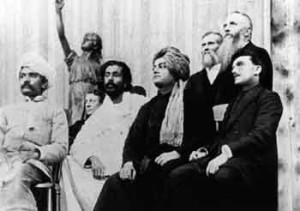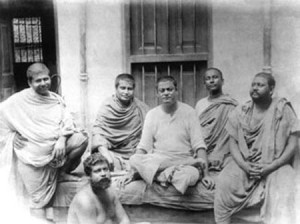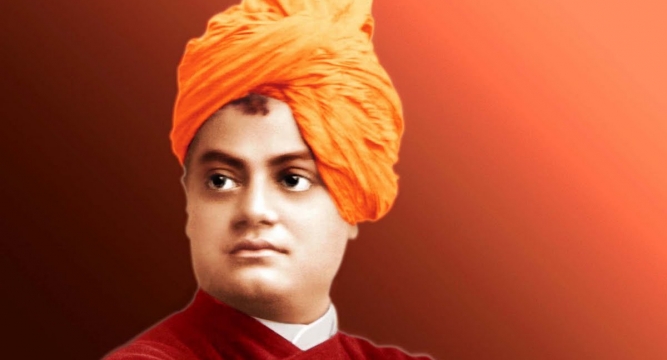No products in the cart.
“Swami Vivekananda saved Hinduism and saved India. But for him, we would have lost our religion and would not have gained our freedom. We therefore owe everything to Swami Vivekananda. May his faith, courage and wisdom ever inspire us, so that we may keep safe the treasures we have received from him”
—–Sri C. Rajagopalachari
These words of Sri C. Rajagopalachari, the noted loyalist, leader with a great vision and philosopher of India, indeed put in a nut-shell the tremendous contribution Swami Vivekananda has made to the national life of India and for the preservation of the Hindu religion. It is a fact that Swami Vivekananda’s greatness surpasses and excels all worldly achievements. These valuable and insightful words were only a partial expression of his transcendent greatness, an idea of which we get from a vision his Great Master, Sri Ramakrishna, had about him even before the two met each other.
The Master said about this vision, “One day, through Samadhi, my eternal mind was passing a dazzling path. Transcending the gross world that is studded with the sun, the moon and the stars, it marked its advent into the subtle world of ideas. The more it began to enter into subtler and subtler strata of that realm, the more did I see beautiful forms of deities existing on either sides of the luminous path. It gradually came to the last extremity of that region. I saw a barrier of light there separating the realms of the divisible and the indivisible. Leaping over it, the mind entered the realm of indivisible. I saw that there was no more any person or form or thing there having a form. As if afraid to enter there, even the gods and goddesses possessing heavenly bodies exercised their authority only over realms far below. But the very next moment, I saw seven wise Rishis having bodies consisting of divine light only, seated there in Samadhi. I felt that in virtue and knowledge, love and renunciation they had excelled even the gods and goddesses, not to speak of human beings. Astonished, I was pondering over their greatness when I saw before me that a part of the homogeneous mass of light of the Abode of the indivisible, devoid of the slightest tinge of difference, had become solidified and converted into the form of a ‘Divine Child’, coming down to one of those Rishis, and throwing its soft and delicate arms around his neck. Hardly had I seen Narendra (Swami Vivekananda of later days) for the first time when I knew he was that Rishi.”
Leaving apart this exceptional background of the eminent personality known as Swami Vivekananda, his enlightened origin has to be traced to the ancient and well known Kayastha family of Dattas of Calcutta, The great grandfather of the Swami, Rammohan Datta, was an eminent lawyer in that city. He had amassed a lot of wealth and was hence held in high esteem in the society. His son Durga Charan Datta was an inheritor of his immense wealth. Despite the wealth, Durga Charan had a strong inclination to spiritual interest, and this desire prompted him to renounced worldly life and become a Sannyasin in his youth. Of him was born his young son Viswanath, aged three years who was destined to perpetuate the legacy. Of Vishwanath Datta and his wife Bhuvaneshwari was born Narendranath Datta, who eventually became famous under the name of Swami Vivekananda. Unlike his father who had renounced worldly life and become a Sannyasin, Vishwanath was not spiritually inclined. However, he was an altruist, generous and a connoisseur of music and other fine arts. An accomplished virtuoso of English and Persian, he was passionate about the Bible and the works of the Persian poet Hafiz. Though he was of a grave and serious demeanor, he had the virtues of wit and humor. He was above all known for his supreme generosity, which made him spend lavishly for others. He was solely responsible for bringing his family to the verge of poverty at his demise. Narendranath Datta was born of him and Bhuvaneshwari on the 12th of January 1863. The legend says that the family was devoid of any male child. So, the mother Bhuvaneshwari offered special prayers to Lord Vireswara (Siva) of Kasi, and that Narendranath Datta was born as a result of her special prayers to the Lord.
Prospects of future greatness, excellence and potential were discernible in him from his very childhood. Needless to say, he was an enthusiastic toddler and a noted child prodigy. However, fits of temper used to get better of him frequently. To obviate the fits of temper, his mother found a strange, yet a promising remedy. It was to put him under a tap and chant Siva’s name. As he grew up, he showed signs of an epitome of excellence and generosity. In his early childhood days, he mastered the aphorisms, rules and finer nuances of Sanskrit grammar Mugdhabodha by hearing them with rapt attention. He recited the hymns every evening, sitting on the lap of an old relative. At school, he used to neglect his class lessons during the early part of the academic year and utilize his time for doing extra-reading. In the last three months, he would study his texts and get high marks. This leisure, he used judiciously to study good books on diverse subjects at different times. For instance, before his entrance examination, he had a strong desire to study Indian history. Without much ado, he completed all the important books on the Indian history subject. In addition, he read many supreme, reliable and factual excerpts on the ancient works of Europe, besides several books on Western philosophy. Not only in his cognitive capacities, but also in virtues of the heart like perseverance, self-esteem, courage, etc., he displayed striking signs of brilliance and caliber. A remarkably precocious poser from a boy of tender years!
At a very young age, Narendra discovered, without the prior advice of anyone, that meditation was the best way for realizing God, and he used to practice meditation regularly in a bolted room without anybody’s knowledge. As his great master said later on, he was born perfect in meditation. While most of the virtues and best qualities portray him as a budding many sided genius, what indeed distinguished him most from others was his rare spiritual excellence. The interim between his birth and discovery of meditation as the plausible way to reach God was a period of continuous introspection, a long and a savage inner struggle. Narendranath’s keen intellect and his inherent spirituality eventually integrated into the celebrated and distinguished personality that the world came to know as Swami Vivekananda in later times. Slowly, he grew up into a young man, while reading in the Presidency College and even earlier, he came to study and absorb the philosophies of many a Western thinker and the methods and conclusions of modern science. However much the pure intellectualism of Western philosophy and science appealed to him, he was aware of their inherent weaknesses. He felt that they were attempting to do with the intellect what it cannot do, namely, give a first-hand knowledge of the supreme, eternal and everlasting truth which spiritualists comfortably call God.
The question whether God can be directly experienced or not therefore became a question of life and death for him. So began his quest for religious leaders of the time- mainly the luminaries of the Brahmo Samaj to know whether they had a direct experience of God. One day in great excitement, he went to Maharshi Devendranath Tagore with the question, “Have you seen God?” The Maharshi was flummoxed. He gave Narendra no direct answer. He, however, affectionately seated Narendra by his side, gave him his blessings and said, “The characteristics of a Yogi are manifest in you. If you practice meditation religiously, you will soon experience the results of it.” It was this insatiable quest of Narendranath for one who had direct experience of God that brought him eventually to Sri Ramakrishna.

The Parliament of Religions which was held from the 11th to the 27th of September, 1893, in the Hall of Columbus, was a part of the World’s Columbian exposition in the city of Chicago. Swami Vivekananda made his debut speech on the world stage when he opened his first short speech at the Parliament with that endearing form of address: “Sisters and brothers of America.” The expression of these five magnificent words worked wonders, thaumaturgy at its best, on that huge audience of nearly six thousand who gave a standing ovation to the Swami for several minutes. This ovation heralded the advent of a new prophet and the harbinger of Hinduism was in the offing. Nobody can gainsay that Hinduism scaled summits during his presence. Awakening of India at the call of Swami Vivekananda is a monumental legacy. The message of pure and blazing patriotism, the love of the Indian people as one whole, is another great ideology he projected through his lectures and utterances.

It was left to Swamiji’s volition to select a day for ending his earthly life, and the day he selected was the 4th of July. At 1 PM, he had all the Brahmacharins assembled and took for them a class on Sanskrit grammar that lasted nearly three hours. A little later in the evening, he had a stroll with Swami Premananda for a distance of about two miles, and in the course of it, he sincerely expressed his desire to have a Vedic college at the Math. Immediately after meditation, Swami Vivekananda eased himself down on a bed on the floor. He called in the waiting disciple, and requested him to fan his head. Nearly an hour passed when the disciple noticed his hands shaking a little. Eventually came two deep breaths which marked the end of the legendary personality.
The rich legacy which Swamiji has left pertains to the fields of service, Hinduism and salvation of the soul.






